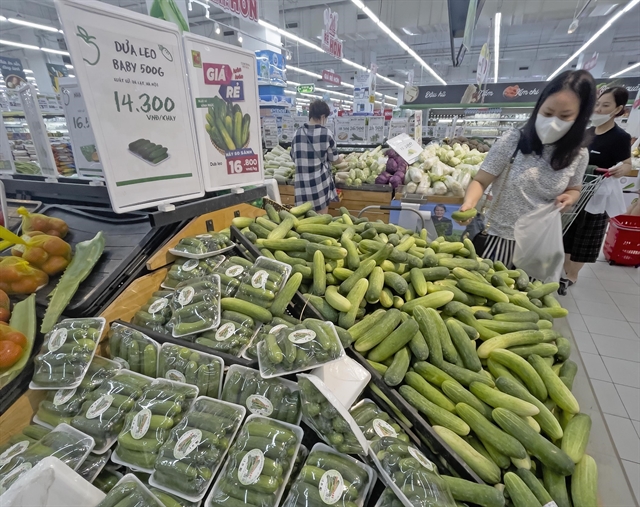 Economy
Economy

Acting director of Hà Nội Department of Industry and Trade Trần Thị Phương Lan said the consumers in the capital as well as nationwide prefer specialty products with clear origins, brand, geographical indication, good quality, so they are willing to accept higher prices than similar products in the market.

|
| Big C & GO Long Biên supermarket in Hà Nội. Consumers in the capital as well as nationwide prefer speciality products with clear origins and good quality. VNA/VNS Photo Trần Việt |
HÀ NỘI — Consumers now not only focus on the quality and price of goods but are increasingly interested in safety and clear origins of the products.
Consumer habits have changed in recent years because the development of supermarkets, trade centres or genuine agents has helped consumers pay more attention to products with safety, brand, and clear origin and geographical indication. That means the Vietnamese consumption goods market is gradually developing quality.
According to a survey on high-quality Vietnamese goods in 2023 recently announced by The Business Association of High Quality Vietnamese Products, for a number of industries such as food and beverage, consumers pay more attention to the safety of products, and clear information about quality and manufacturers.
The survey on Consumption Habits 2023 of PricewaterhouseCoopers (PwC) also shows that although people are planning to reduce spending and the economy is still facing difficulties, consumers are still willing to pay more for products that are made by reputable companies.
The safe agricultural products weeks of Sơn La Province earlier this month and those similar weeks of other provinces and cities at Big C Thang Long are opportunities for the residents in Hà Nội to enjoy speciality products that meet VietGAP, GlobalGAP, OCOP, organic food safety standards of those localities such as plum, mango, jackfruit, longan and dragon fruits.
According to Nguyễn Thị Bích Vân, communications director of Central Retail Group, the consumers have highly appreciated those products at Central Retail's food retail system (GO!, Big C, Tops Market).
About 60 kinds of agricultural products from Sơn La Province are regularly sold on the shelves of 18 supermarkets GO!, Big C, and Tops Market in the North.
In 2022, the amount of Sơn La's agricultural products in Central Retail's supermarkets increased by 20 times, even some items like cabbage grew by 80 times, she said.
Ma Thị Ninh, director of Yến Dương Cooperative in Bắc Kạn Province, said that the cooperative has always focused on the quality of safe products. Now, it has three OCOP products at the provincial level, ash gourd, sticky rice and vermicelli.
The Yến Dương Cooperative's products are manufactured and processed according to safe processes with traceability stamps. It will continue following this goal in the future.
Similarly, after being granted a geographical indication, the value of Shan tuyết tea products of Sơn Trà Cooperative in Hồng Thái Commune, Tuyên Quang Province has increased, and it also has attracted more consumers.
Đặng Ngọc Phố, deputy director of the Sơn Trà Cooperative, said that in the past, Hồng Thái Shan tuyết tea was mainly supplied to the provincial market. Now it is marketed in big cities such as Hà Nội, Hải Phòng and Đà Nẵng.
Acting director of Hà Nội Department of Industry and Trade Trần Thị Phương Lan said the consumers in the capital as well as nationwide prefer speciality products with clear origins, brand, geographical indication and good quality, so they are willing to accept higher prices than similar products in the market.
In the context of deepening integration, many businesses are producing standardised products to encourage consumers to choose Vietnamese products, Lan said.
When the market has fierce competition, transparency of information and origin, and product quality are advantages for businesses in increasing brand value and revenue, and gaining a strong position in the market, she said.
According to Lan, Hà Nội People's Committee has also issued an action plan and implemented solutions to promote organic production and strengthen linkages between the production and supply of goods under chains. — VNS




